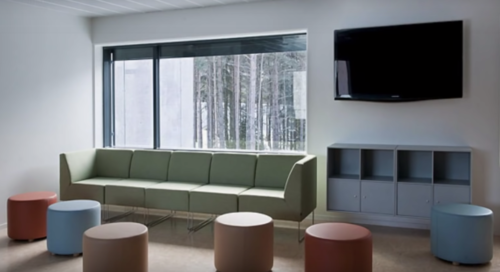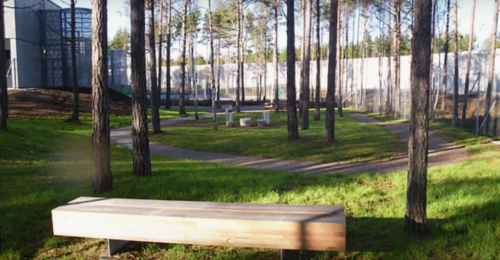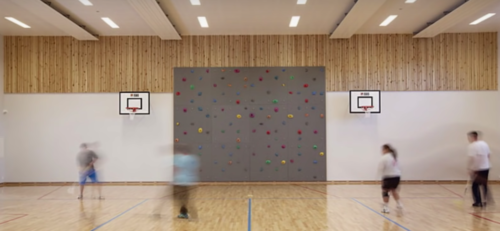Michael Moore Goes to Norway and Visits Halden Prison
Inside Halden Prison, the Most Humane Prison in the World
Halden Prison opened early in 2010 with a capacity of 252 prisoners. The prisoner cells include flat-screen televisions, designer furniture, mini-fridges, and en suite bathrooms.

Half of the guards are females, and guns are not usually carried because they create “unnecessary intimidation and social distance.” During the day, inmates can shoot hoops, climb the indoor rock wall, go jogging or make use of the soccer field.

Wikipedia: The Staff at Halden
As of 2012, Halden had 340 staff members, including teachers, healthcare workers, personal trainers, and guards. The philosophy of “dynamic security”, which encourages the staff and the inmates to develop interpersonal relationships, helps prevent potential aggression and guarantees safety.
Guards eat meals and play sports with the inmates, and are typically unarmed because guns can produce intimidation and social distance.

The interaction between prisoners and the staff is designed ‘to create a sense of family,’ according to architect Per Hojgaard Nielsen, and because the staff can be role models to help the inmates to recreate their sense of daily routine, for application outside of prison walls once their sentence is over.
The guard stations were designed to be tiny and cramped, to encourage officers to interact more with the inmates.
How Norway Turns Criminals into Good Neighbours
Twenty years ago, Norway moved away from a punitive “lock-up” approach and sharply cut re-offending rates.
The architecture of Halden Prison has been designed to minimize residents’ sense of incarceration, to ease psychological stress and to put them in harmony with the surrounding nature – in fact the prison, which cost £138m to build, has won several design awards for its minimalist chic.
Set in beautiful blueberry woods and peppered with majestic silver birch and pine trees, the two storey accommodation blocks and wooden chalet-style buildings give the place an air of a trendy university campus rather than a jail.
***
On Bastøy prison island in Norway, the prisoners, some of whom are murderers and rapists, live in conditions that critics brand ‘cushy’ and ‘luxurious’. Yet it has by far the lowest reoffending rate in Europe.
Arne Kvernvik Nilsen, the departing governor in 2013 with the re-offending rate at Bastøy just 16%, shares the secrets of his remarkable success:
“If someone did very serious harm to one of my daughters or my family … I would probably want to kill them. That’s my reaction. But as a prison governor, or politician, we have to approach this in a different way. We have to respect people’s need for revenge, but not use that as a foundation for how we run our prisons. Many people here have done something stupid – they will not do it again.
“But prisons are also full of people who have all sorts of problems. Should I be in charge of adding more problems to the prisoner on behalf of the state, making you an even worse threat to larger society because I have treated you badly while you are in my care? We know that prison harms people.
“I look at this place as a place of healing, not just of your social wounds but of the wounds inflicted on you by the state in your four or five years in eight square metres of high security.”
“Losing liberty is sufficient punishment – once in custody we should focus on reducing the risk that offenders pose to society after they leave prison. For victims, there will never be a prison that is tough, or hard, enough.
“But they need another type of help – support to deal with the experience, rather than the government simply punishing the offender in a way that the victim rarely understands and that does very little to help heal their wounds.
“Politicians should be strong enough to be honest about this issue.”
Why The World’s Cushiest Prison Is Also Among Its Most Effective
What We Can Learn from Norway’s Prison System
Norwegians believe in a concept called restorative justice, which aims to repair the harm caused by crime rather than punish people. Guards in this country consider it as a duty to prepare inmates as well as possible for the real world.
This also entails that prisoners don’t just sit in their rooms all day. They have to farm, cook, chop wood and hammer to keep the community going. For all of this, they’re allowed to use knives, hammers and other potential killing tools.
When a guard on Bastøy was asked if being unarmed against this potential threat didn’t frighten him, he answered: “no, we talk to the guys, that’s our weapon.”
Not far away from Bastøy is the Haldon Prison. The 75-acre facility also maintains as much “normalcy” as possible. That means large rooms with private bathrooms instead of cells, no bars on the windows, and friendships between guards and inmates.
For Norway, removing people’s freedom is enough of a punishment.
As Are Hoidel, Halden’s prison director, puts it:
“All inmates in Norwegian prisons are going back to society. Do you want people who are angry — or people who are rehabilitated?”
I invoke Sanat Kumara and Universal Law
for balance in all our prison systems.

THE SCALES OF JUSTICE, OF WORTH AND OF THE UNIVERSE, IN BALANCE

